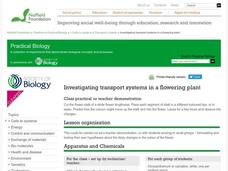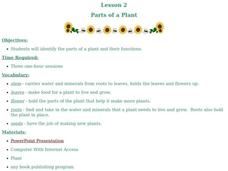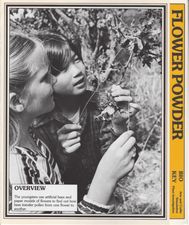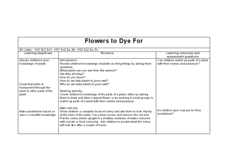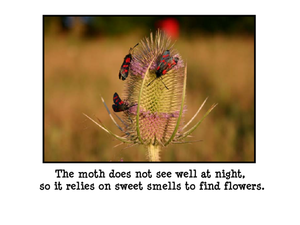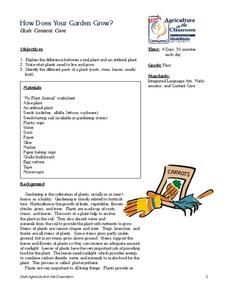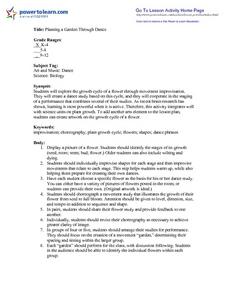Curated OER
Fantastic Flower
Here is a clever lesson on pollination of flowers for you. In it, learners study the anatomy of a flower, and play a game in which they simulate the process of pollination. This fine plan brings in elements of art, physical education,...
Curated OER
Plant Pollination
Middle schoolers investigate methods of pollination for various flowers. In this plant biology lesson, students learn the parts of a flower and form a hypothesis about the method of pollination for the flower. They determine the validity...
Curated OER
Flower Power
Students explore parts of the flower. In this plant biology lesson, students dissect flowers and identify how the seeds are formed. Students take a nature walk to pick flowers for future dissections.
Curated OER
Tutti Frutti
Get some competition going in your life science class. Give lab groups a variety of plant parts, all of them fruits, except one. Their mission is to make observations, compare and contrast, in order to be the first to identify the...
Nuffield Foundation
Investigating Transport Systems in a Flowering Plant
Some weddings have flowers in a unique, unnatural color to match the theme. Young scientists take part in this process to learn about the function of the xylem as they observe colored water moving through a flower. Then, they experiment...
Curated OER
Flower Power
Students explore the parts of flowers and how they reproduce. They dissect flowers and observe the reproductive organs. Students observe anthers and ovaries of Tiger Lilies under a microscope. They investigate how insects and other...
Curated OER
Parts of a Plant
Students identify the parts of a plant and their functions. In this plant biology lesson, students view a PowerPoint presentation on plants and their parts and discuss the functions of each part. Students observe a real plant and...
Curated OER
Mutualism and Co-evolution A study of Flowering Plants and their Pollinators: Biology, Plants
These lessons use a variety of methods and approaches to teach flowering plant biology which includes seed germination; plant growth and food production through photosynthesis; plant transpiration and respiration; sexual reproduction...
Curated OER
Flower Powder
Students collect and observe pollen. In this plant reproduction biology lesson, students use pollen boards to collect pollen from flowers, then match it with the correct paper flowers. Students move artificial bees from flower to flower...
Curated OER
Flowers: Form and Function
Students recognize and name the parts of a flower. They explain the function of each part of a flower. Students list the steps that occur for sexual reproduction of a plant to take place. They recognize and name the male reproductive...
Curated OER
Flower Dissection
Students dissect three different flowers and compare and contrast them. In this flowers lesson plan, students learn about the flower anatomy and then dissect their own flowers.
Curated OER
Plant Transpiration
Young scholars conduct various experiments to investigate plant transpiration. For this biology lesson, students explain how this process helps maintain the hydrologic cycle. They measure the rate of water loss in plants using a potometer.
Curated OER
Plant Dissection
Students study plant parts and their functions in a dissection activity. In this plant dissection instructional activity, students use several handouts to help them learn parts of the plant and their functions. Students then dissect...
Curated OER
Parts of a Plant
Students explore biology by listening to an in-class lecture. In this plant science lesson, students sing songs with their classmates regarding anatomical parts of a plant and create plants from arts and crafts materials. Students listen...
Curated OER
Flowers to Dye For
Students observe biology by completing a plant experiment in class. In this botany lesson, students discuss the anatomy related to a plant and how roots and stems are necessary to its survival. Students utilize food coloring and examine...
Curated OER
Plant Reproduction
Students identify the different parts and function of a flower's reproductive system. For this biology lesson, students explain how pollination works. They watch a video and practice labeling parts of both flower and leaf.
Curated OER
Smarty Plants
Young scholars examine plants and pollinators. In this plant biology instructional activity, students read The Power of Pollinators and identify the parts of the plant and the pollinators. Young scholars design their own imaginary plants.
Curated OER
Pollination
Students investigate pollination. In this plant biology lesson, students study a diagram of the reproductive parts of the flower and dissect and identify the parts of a real flower.
Curated OER
How Does Your Garden Grow?
Students identify what plants need to grow. In this plant biology instructional activity, students analyze the differences between an artificial plant and a live plant. Students plant seeds and discuss what plants need to grow. Students...
Curated OER
Make your Garden Grow
Fourth graders role play as certified horticulturists as they study the biology of plants and gardening. They design a garden for their school based on what they researched and a given budget.
Curated OER
Planting a Garden Through Dance
Students create a dance study based on the growth cycle of a flower. They improvise movements that relate to each stage of growth. They create artwork on the growth cycle of a flower. They perform their dances for the whole class.
Curated OER
The Great Pollinators
Students discover the reproductive parts of a plant. In this biology lesson, students identify and categorize several different plants they dissect in class. Students record their information using a data chart.
Curated OER
Colorful Nutrients
Students participate in an experiment to understand how plants get nutrients. In this plant nutrition, lesson students examine how colored water goes through the stem of a plant to the flower. Students discuss the parts of the flower and...
Curated OER
Flowering Phenology: How Do Plants Know When To Flower?
Students explore the biotic and abiotic factors that affect plant reproduction and the potential consequences of human activities on plant populations. The effects of urbanization are discussed as an influence in the consequences.






